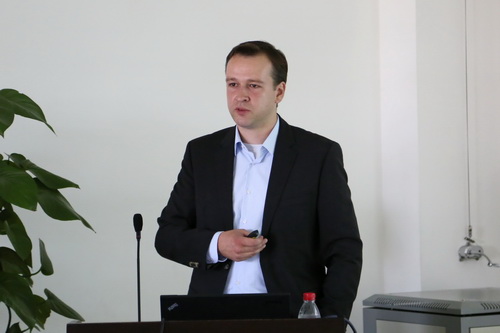
Invited by Key Laboratory of Photochemical Conversion and Optoelectronic Materials, Technical Institute of Physics and Chemistry, Chinese Academy of Sciences (TIPCCAS), Prof. Arne Thomas from Department of Chemistry / Functional Materials,Technical University of Berlin visited TIPC on Sep, 10 and gave an academic report entitled Porous Materials: From Hard to Soft Functional Frameworks.
Micro- and mesoporous materials, i.e. materials with pores of just a few nanometres in diameter and very high surface areas, are of considerable interest for fundamental research and industrial applications. In fact, inorganic porous materials such as zeolites are widely used in industry, e.g. as adsorbents, heterogeneous catalysts or for molecular separations. Despite the success of these materials, it is widely recognised that the synthesis of entirely novel micro- and mesoporous materials can provide new opportunities in emerging technological areas. Of particular interest is the design of such materials from functional compounds, as this allows for an exquisite control over the chemical nature of the large accessible surface areas as well as the physical properties of the resulting networks.
In the report, Prof. Arne Thomas gave an overview over the synthesis of such functional porous materials, with a focus on their use in catalytic applications, especially the activation of small molecules.They have developed various strategies towards the synthesis of such functional porous materials in recent years. Chemical composition, structure and properties of these materials are optimized to reach a specific aim or application. Material compositions investigated in their group are ranging from porous silica and metal oxides, to carbon and carbon nitrides, to polymers and organic frameworks.
Arne Thomas studied chemistry in Gie?en, Marburg (both Germany) and Edinburgh (UK). He earned his doctorate with Professor Markus Antonietti at the Max Planck Institute of Colloids and Interfaces in Potsdam/Golm in 2003. Subsequently he worked with a Feodor Lynen fellowship from the Alexander von Humboldt Foundation at the University of California, Santa Barbara / USA in the laboratory of Professor Galen D. Stucky (2004-2005). In 2005 he returned to the MPI of Colloids and Interfaces, where he worked as a research group leader and scientific coordinator of the project house "EnerChem", a merger of five Max Planck Institutes, which are jointly developing ‘Nanochemical concepts of a sustainable energy supply’. In mid-2009 he accepted the position as full professor of inorganic chemistry (functional materials) at the Technical University of Berlin and joined the Cluster of Excellence “UniCat-Unifying Concepts in Catalysis”. He recently received an ERC starting grant and the Bayer Early Excellence in Science Award. The main interest of the Thomas group is the synthesis and application of nanostructured materials, with a special focus on the generation of porous functional materials for catalytic applications. The scope of materials used for this purpose is ranging from inorganic to organic compounds, for example silicas and metal oxides, carbons and carbon nitrides, organosilicas, polymers and organic frameworks.
NEWS